
Discussions have begun in several government departments about the future for foreigners who took advantage of the visa amnesty which ends in just over a month’s time. Holders of all temporary visas and border passes expiring from March 26 onwards – but not including those renewing one year extensions of stay such as retirees and some work permit holders – have approval to remain in the kingdom until July 31 without visiting an immigration bureau or filling in any forms. Publicly, Thai authorities are tight-lipped about what may happen afterwards.
The silence is understandable. A lot can change over the next five weeks. The reopening of Thai airports and firm flight schedules are, literally, up in the air. The health and insurance documentation needed to travel varies country by country as do the quarantine requirements. Some countries even currently require visitors to “prove” they were in self-quarantine one or two weeks before going to the airport. Nobody seriously expects universal clarity by the end of next month.
The situation is equally blurred on the land border front with neighboring countries. An announcement on June 5 stated that MOU (Memorandum of Understanding) migrant workers from Cambodia, Laos and Myanmar had received permission to stay in Thailand until July 31. Although there has been substantial human traffic to and from border posts for migrants working in the construction, fisheries and other industries, tourists from anywhere in the world are banned. This means, for example, that farang cannot renew their visa by land nor make applications for fresh documentation at Thai embassies.
The amnesty regulations last April did contain a clause that foreign tourists and others who had entered Thailand by land and obtained a two weeks’ pass or border permit should leave Thailand “within seven days” after the borders reopen. To judge from the websites of the embassies and governments of Thailand’s neighboring countries, freedom to travel will continue to be heavily restricted well beyond July 31. You can count on it.
Given these circumstances, some arrangements for the period beyond the current amnesty will need to be announced. The whole point about the discretion currently in operation has been to avoid crowding and chaos at local immigration offices. One suggestion put forward is a further, semi-universal visa amnesty until the end of the year, but this is unlikely to proceed as it defies all security concerns which are of paramount importance to the government. Not to mention loss of substantial income for a further five months. Doesn’t sound likely.
Another suggestion would be to introduce a complex new-normal in which foreigners taking advantage of the current amnesty would be dealt with country by country. For example, Europeans who arrived by plane might be given a two weeks’ notice to get a flight and go home, whilst tourists who crossed by land last time might be given further joy until the border crossings reopen for all. However, the complexity of individual situations across so many nationalities herded into a one-size-fits-all box seems overwhelming. Imagine the complaints. Phones at the embassies would be ringing like never before.
A more popular scenario might be to leave it to the customer. In other words, the visa amnesty might be extended for, say, two weeks without the need to visit an immigration office or fill in forms. Those still in Thailand after mid-August would then fall into the overstay category unless they paid 1,900 baht at their local immigration office for a further one month’s extension. The hope would be that the international scenario would be clearer by mid-September. This temporary solution in an uncertain world would need to include provisions for avoiding everybody rushing to their immigration office on the same day.
A further issue to be clarified is the 90 days report which has been unnecessary for long stay foreigners and annual extension retirees during the current amnesty – although reports from immigration bureaux indicate that many have been reporting anyway in a sensible precaution. Sure, the 90 days report is likely to be reinstated in all its glory, especially now that the TM30 regular reporting of address nonsense has been much reduced in scope.
One way forward would be to inform those needing to do a 90 days report to report three months after the last, notional, due date during the amnesty period. For example, if a retiree needed to do a report on June 14 and did not do so because of the amnesty discretion, he or she would next report in mid-September within the permitted time span of two weeks before or one week after the due date.
The one thing that the immigration authorities will want to avoid in all the uncertainties of the Covid-19 pandemic is a panic siege of their nationwide offices on the morning of August 1. Except that it’s a Sunday.
 |
 |
 |





